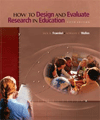 |  How to Design and Evaluate Research in Education, 5/e Jack R. Fraenkel,
San Francisco State University
Norman E. Wallen,
San Francisco State University
Data Collection in Qualitative Research
Main PointsObserver Roles - There are four roles that an observer can play in a qualitative research study, ranging from complete participant, to participant-as-observer, to observer-as-participant, to complete observer. The degree of involvement of the observer in the observed situation diminishes accordingly for each of these roles.
Participant versus Nonparticipant Observation - In participant observation studies, the researcher actually participates as an active member of the group in the situation or setting he or she is observing.
- In nonparticipant observation studies, the researcher does not participate in an activity or situation, but observes "from the sidelines."
- The most common forms of nonparticipant observation studies include naturalistic observation and simulations.
- A simulation is an artificially created situation in which subjects are asked to act out certain roles.
Observation Techniques - A coding scheme is a set of categories an observer uses to record a person or group's behaviors.
- Even with a fixed coding scheme in mind, an observer must still choose what to observe.
- A major problem in all observational research is that much that goes on may be missed.
Observer Effect - The term "observer effect" refers to either the effect the presence of an observer can have on the behavior of the subjects or observer bias in the data reported. The use of audio- and videotapings is especially helpful in guarding against this effect.
- For this reason, many researchers argue that the participants in a study should not be informed of the study's purpose until after the data have been collected.
Observer Bias - Observer bias refers to the possibility that certain characteristics or ideas of observers may affect what they observe.
Sampling in Observational Studies - Researchers who engage in observation usually must choose a purposive sample.
Interviewing - A second major technique commonly used by qualitative researchers is that of in-depth interviewing.
- The purpose of interviewing the participants in a qualitative study is not only to find out what they think or how they feel about something but also to provide a check on the researcher's observations.
- Interviews may be structured, semistructured, informal, or retrospective.
- The six types of questions asked by interviewers are background or demographic questions, knowledge questions, experience of behavior questions, opinion or values questions, feelings questions, and sensory questions.
- Respect for the individual being interviewed is a paramount expectation in any proper interview.
- Key actors are people in any group who are more informed about the culture and history of the group, and who also are more articulate, than others.
- A focus group interview is an interview with a small fairly homogeneous group of people who respond to a series of questions asked by the interviewer.
- The most effective characteristic of a good interviewer is a strong interest in people and in listening to what they have to say.
Reliability and Validity in Qualitative Research - An important check on the validity and reliability of the researcher's interpretations in qualitative research is to compare one informant's description of something with another informant's description of the same thing.
- Another, although more difficult, check on reliability/validity is to compare information on the same topic with different information ― triangulation.
- Efforts to ensure reliability and validity include use of proper vocabulary, recording questions used as well as personal reactions, describing content, and documenting sources.
|
|



 2003 McGraw-Hill Higher Education
2003 McGraw-Hill Higher Education